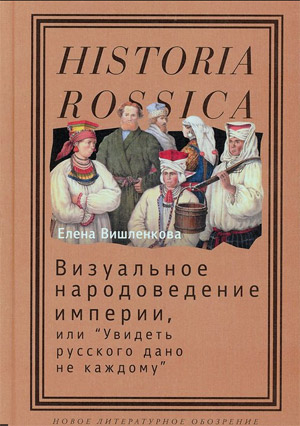Vishlenkova E. A. Visual Ethnography in an Empire, or 'Not Everyone Can Discern a Russian'. M.: Novoe literaturnoe obozrenie, 2011.

Vishlenkova E. A. Visual Ethnography in an Empire, or 'Not Everyone Can Discern a Russian'. (Vizual'noe narodovedenie imperii, ili «Uvidet' russkogo dano ne kajdomu» M.: Novoe literaturnoe obozrenie, 2011. 384 s.)
This book analyzes the graphic images of the peoples of Russia, their creation and existence in the culture. These images include fine prints, lubok pictures, cartoons, paintings on plates, medals, ethnographic portraits, map cartouches from the late eighteenth and early nineteenth century. Each image is treated as a unit of a general visual language invented to describe various groups and to function as a mediator in the process of generating new cultural and political communities (for example, to show the non-obvious ‘Russian people’). The book explores the mechanisms of transforming ethnic stereotypes, scientific theories, topoi and fantasies in images. The reader will learn how physiognomic conventions and aesthetic conventions on the beautiful and the ugly were used to display the cultural and psychological characteristics of peoples. The author shows how images engendered group mobilization in the audience and how an ambiguous understanding of what a ‘nation’ is matured in the realm of the visual. Thus this study identifies cultural boundaries between nations that existed in the imagination of the Russians in the ‘pre-national’ era.
[Review by Prof. Nikos Chrissidis] // The Russian Review. April 2013, 72(2). P. 302-304.
CONTENTS
Acknowledgements
Introduction
Panorama of the study
Art optics
Spectacular era
Architectonics of the book
Chapter 1. ‘Russian costumes’ – ‘Costumes of Russia’
Seeing the people as a challenge for the government
The art of seeing
The visual packaging for instrumental knowledge
‘Costumes’ in commercial production
The ‘popular’ utopia for the Empire
‘The Russian character’
Chapter 2. Russian physiognomy and Russian beauty
‘Scratch a Russian, and you will find ...’
The need for inner vision
‘The Russian taste’
Ethnographic portraits
Chapter 3. ‘Friends’ and ‘aliens’ in 1812 caricatures
Caricature as a social message
Versions of the war
‘Russian feelings’
Enemy images
Variants of the collective body
The Russian as a metaphor of strength
‘The Russian’ in word and deed
Chapter 4. "One recognizes one’s like best"
The (not so) long age of caricatures
‘The Holy Empire of the Slavic Nation’
‘Russianness’ in the eye of the beholder
“Russian, just as you are"
Chapter 5. ‘The Russian in art’ or ‘Russian art’?
The place of the viewer’s dialogue with the artist
Fighting over the rules
The Museum of Russian artists
The treasury of Russian art
Final reflections
Literature
List of Abbreviations
Name Index